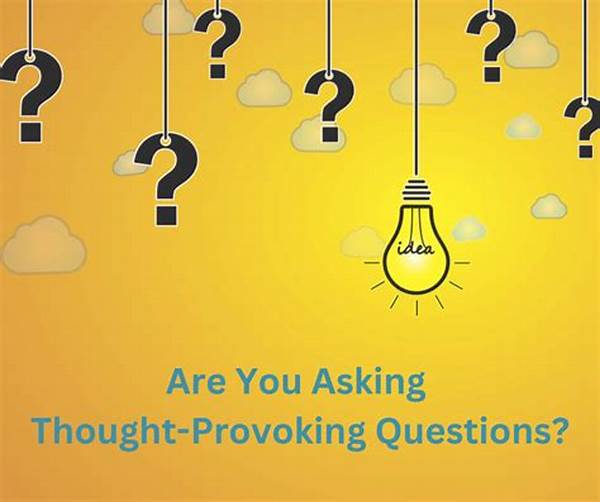Once upon a time, in a smoky little café tucked away in a bustling metropolis, a group of friends gathered every Friday evening to delve into the mysteries of the universe. They weren’t your typical book club. No, these folks were seekers of truth, explorers of the mind, philosophers at heart. Among their spirited debates, no topic caught their fancy quite like the age-old question of consciousness. Ah, philosophical perspectives on consciousness—what a rabbit hole to fall into! Each sip of coffee seemed to unlock another layer of understanding, and the lingering scent of roasted beans mixed with the aroma of intellectual curiosity.
Read Now : Facilitator-led Literature Discussion Templates
Revealing the Layers
On this particular evening, the conversation had drifted to the very heart of philosophical perspectives on consciousness. You see, consciousness isn’t some straightforward jigsaw puzzle, it’s more like a kaleidoscope of thoughts. The way these friends saw it, there were as many perspectives as there were grains of sand on a beach. Each philosopher they discussed had taken a unique stab at explaining the inexplicable. There was Descartes with his “I think, therefore I am,” and that mind-bending suggestion that existence hinged on the act of thinking. Locke chimed in too, with his idea that consciousness is tied to memory—a concept that would have anyone questioning their own recollections. The dialogues went on, with each friend pitching their philosophical perspectives on consciousness, turning the café into a microcosm of debate.
The group laughed and argued, each trying to outdo the other with theories and ideas. They were hooked on the idea that perhaps consciousness is itself a kind of mirror, reflecting the reality we experience. For them, it wasn’t just about exploring different perspectives; it was about peering into their own consciousness, hoping to catch a glimpse of the elusive “self.” These discussions often flowed into the early hours of the morning, their passionate voices softening as the café lights dimmed. For these friends, seeking philosophical perspectives on consciousness wasn’t just an intellectual exercise—it was a journey of self-discovery.
Mapping the Philosophical Landscape
1. Once you dive into the realm of philosophical perspectives on consciousness, there’s no turning back—it’s a never-ending mind game.
2. Everybody’s got a theory, right? And when it comes to philosophical perspectives on consciousness, it’s like a wild storytelling session where anything goes!
3. Talk about challenging the old noggin! Delving into philosophical perspectives on consciousness can sometimes feel like chasing shadows.
4. Why settle for one explanation when philosophical perspectives on consciousness offer you a buffet of mind-bending ideas?
5. It’s like exploring a maze, with every philosopher offering a different route through the labyrinth of consciousness.
Riding the Thought Waves
Exploring philosophical perspectives on consciousness can sometimes feel like surfing on an ocean of thoughts—you’re trying to keep your balance while riding the waves of profound ideas. It’s fascinating, though, watching the way different thinkers have pieced together their take on what makes consciousness tick. One minute you’re nodding along with Aristotle, convinced that consciousness is all about the soul, and the next, you’re deep-diving into the waters of materialism, pondering whether neurons firing in your brain really are all there is. It’s dizzying yet exhilarating.
For these philosophical surfers, the thrill is in the journey. Each session around the café table is a ride on a thought wave, a chance to see things differently. They might not always agree—heck, they rarely do—but the clash of ideas is what keeps them coming back for more. For them, philosophical perspectives on consciousness aren’t just some abstract intellectual pursuit. They’re the essence of what it means to be human, to question, to wonder, and ultimately, to seek understanding in this crazy, consciousness-filled world.
Jargon’s Dance
1. Consciousness, dude, it’s like the ultimate mind trip—a kaleidoscope of philosophical perspectives on consciousness that’ll make your head spin.
2. Digging into philosophical perspectives on consciousness is like being on an epic quest to find the Holy Grail of understanding.
3. Philosophers have been throwing down their perspectives on consciousness like it’s a philosophical battle royal.
4. Wrapping your brain around philosophical perspectives on consciousness can sometimes feel like trying to squeeze an elephant into a phone booth.
Read Now : Language Learning Stories For Toddlers
5. Just when you think you’ve got a handle on it, philosophical perspectives on consciousness throw you a curveball and leave you pondering once more.
6. It’s a wild ride of mental gymnastics, flipping through philosophical perspectives on consciousness like they’re pages in a cosmic storybook.
7. Hanging with philosophical perspectives on consciousness is like sipping from an endless cup of wisdom—always refreshing, never boring.
8. Swapping theories on philosophical perspectives on consciousness is like jamming with your favorite band, each riff a new insight.
9. It’s a treasure trove of ideas, these philosophical perspectives on consciousness, just waiting for you to dive in and explore.
10. When you’re diving into philosophical perspectives on consciousness, it’s like having a chat with the universe itself.
Dancing with Complexity
Down in the heart of the philosophical jungle, lies the enigma of consciousness—an intricate dance of thoughts, a tapestry woven by thinkers across time. In the cozy whispers of that café, our friends explored this concept, sharing their personal philosophical perspectives on consciousness. Each idea, each theory, added a new thread to the conversation’s rich tapestry. They bounced from Kant’s categorical imperative to Hume’s skepticism, embracing the intellectual odyssey like explorers hunting for hidden treasures.
Participating in these discussions was a rite of passage—a chance to stretch the boundaries of their understanding. They were artists painting with words, philosophers facing a storm of questions, each answer leading to more inquiries. The philosophical perspectives on consciousness offered them countless paths to wander and wonder. Was it all just neurons in the brain? A grand illusion? Perhaps something even more mystifying than they could ever conceive?
As the night sky blanketed the city, the café hummed with the rhythm of discovery. The friends knew they were engaged in a dance as old as humankind itself, an attempt to capture the essence of consciousness. With every discussion and shared thought, they came closer not to definitive answers, but to a deeper appreciation for the beauty and complexity of the human mind—a journey they knew was limitless, just like the philosophical perspectives on consciousness.
Reflecting on the Journey
Sitting back in their chairs, the group often found themselves reflecting on their vivid forays into philosophical perspectives on consciousness. By now, they realized this journey was less about reaching a destination and more about the adventure itself. Little by little, their perspectives shifted, and with each meeting, their understanding deepened, a testament to the ever-evolving nature of consciousness itself. As they navigated the twists and turns of philosophical thought, they cherished the camaraderie as much as the intellectual pursuits.
Every discussion seemed to unlock a new facet of the mystery. Whether they were dissecting Descartes’ mind-body dualism or exploring Eastern philosophies’ take on consciousness, there was a relentless curiosity that spurred them on. The philosophical perspectives on consciousness were like a treasure map with no “X” to mark the spot—an endless dialogue with no bounds. To them, it was a joy, a delight to have their minds stretched to new dimensions, a reminder of the endless potential within the vast landscape of human thought and experience.




